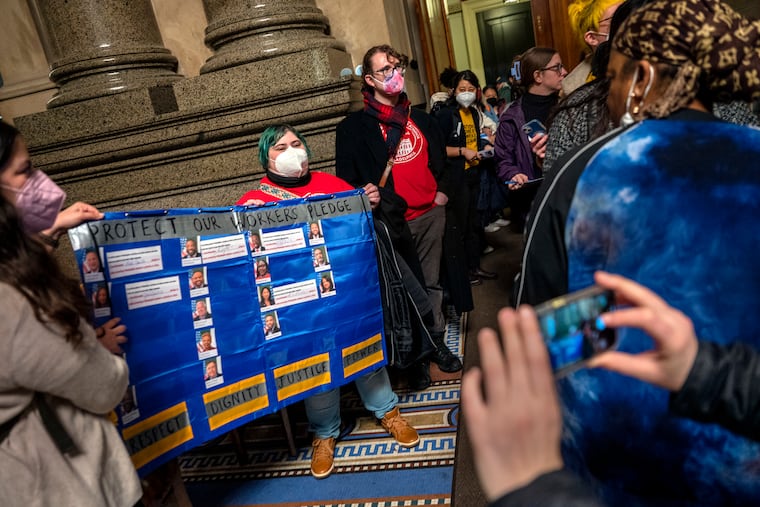Advocates push for City Council to support workers rights legislation
City Council is back in session and workers are asking for legislation that supports their rights.

As City Council’s new term began, workers gathered at City Hall to seek Council’s support for labor rights legislation in the 2024 agenda.
The Council has passed labor legislation in recent years, including the domestic workers bill of rights. But, “due to underfunding and increasing employer retaliation against workers who assert their rights, the promise of that legislation is not fully realized,” according to Nicole Kligerman, director of the Pennsylvania chapter of the National Domestic Workers Alliance.
About 45 domestic workers, temporary workers, and restaurant workers gathered at City Hall on Thursday. In a busy day for Council, amid the first day of the new session and a news conference by critics of a proposed Sixers arena in Chinatown, they asked Council members to support workers’ rights and rallied for an anti-retaliation bill that advocates have been working with Councilmember Kendra Brooks’ office to shape.
House cleaner Guadalupe Canchola, 65, got the first pledge of the morning, after Councilmember Mark Squilla signed a white paper with red letters that read:
“I, Councilmember ____, pledge to make protecting Philadelphia workers a priority in 2024.”
He was one of eight of Council’s 17 members who voiced support Thursday.
“They provide a great service for residents of the city of Philadelphia, it’s important for them to know they have support of elected officials,” Squilla said, while emphasizing the legislative body’s current focus is on public safety, homelessness, and addiction.
For Canchola, after years of experiencing verbal abuse, wage theft, and retaliation, that signature made her feel seen. “City Hall recognizes our work; they know we are here and that we will fight for our rights,” she said.
Why is anti-retaliation legislation being sought?
The Domestic Worker Alliance has educated workers on their rights, Kligerman said. However, some workers have been fired or blacklisted after attempting to negotiate a contract.
“Workers are deemed as a ‘problem’ for speaking up,” Kligerman said. “That’s exactly why we need better anti-retaliation language in our laws, so there are real consequences when employers violate a law like this,” she added.
What could this new legislation entail?
Kligerman said groups like hers are pushing for legislation to improve labor enforcement and enhance anti-retaliation protections to include:
A fast-track unit for retaliation cases, where employers are told immediately that they are under investigation.
A worker-justice fund to financially support workers who have been unfairly fired, or are in need of mental health support for abuse they have experienced on the job.
Having a “bad actor database,” where workers can look up employers.
Hiring more labor lawyers, translators, and interpreters.
However, this is contingent on funding. The Office of Worker Protections would need at least a $2.5 million budget to turn such legislation into reality, Kligerman said.
“We need the Office of Worker Protections to be fully funded under Mayor Parker’s new budget. Right now there are long wait times and chronic understaffing ... . The result of claims taking so long is that workers are really disheartened and losing faith in the process,” Kligerman said.
Who signed the petition?
By the end of the Council’s first session, those who had signed the pledge included Councilmembers Squilla, Jamie Gauthier, Curtis Jones Jr., Isaiah Tomas, Rue Landau, Nicholas O’Rourke, Cindy Bass, and Jeffery Jay Young Jr.